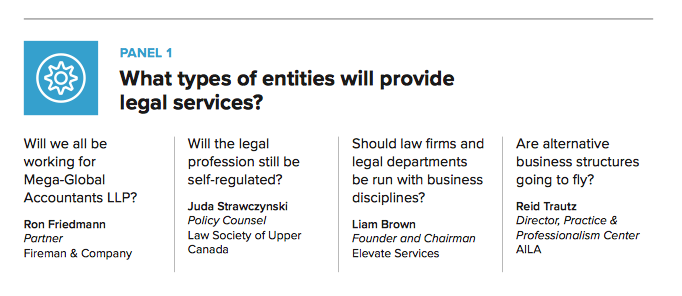Will all lawyers work for the Big 4 by 2026?
Last month Ron Friedmann addressed the question ‘Will All Lawyers Work for the Big 4 by 2026?’. Ron is a highly regarded commentator on big issues in the legal services industry, so his answer to this provocative question about the impact of the Big 4 on the established order is a welcome contribution to Dialogue.
Will all lawyers work for the Big 4 by 2026? was posed in a future-oriented panel discussion on types of entities that will provide legal services held last month during the College of Law Practice Management 2016 Futures Conference.

Here’s what Ron had to say presented as an outline of his five-minute answer to the question.
Will All Lawyers Work for Mega Accountants by 2026?
The conference used the term ‘mega accountants’ in referring to the Big 4, but as Ron notes ‘it’s hard to imagine in 10 years that term will mean anything other than the current Big 4.
- The short answer: No
- The longer answer: a higher percent of lawyers and staff will work for Big 4 than do now, perhaps much higher
- Characteristics of the Big 4 that explain why they will gain share from Big Law
- Multidisciplinary
- Clients want and like multi-disciplinary approaches to business problems and many “legal problems” are really business problems
- Business problems take teams to solve, teams that consist of multiple areas of subject matter expertise
- Is there a “non-accountant”? The Big 4 have a less powerful caste system so they can more readily tap multiple professionals and areas of expertise
- More cost-effective and more willing to invest and innovate
- Decades of audit price pressure taught the Big 4 how to deliver at lower cost
- This includes investing in tech, process improvement, project management, and knowledge management (KM)
- Higher investment in training, tools, process and KM means more efficient “industrial delivery”, which means high-quality output at lower cost
- A significant portion of Big Law work is more routine than many lawyers think. Routine work is at risk of shifting to Big 4. “Factory” and “industrial” remain dirty words to lawyers – less so or not so to Big 4
- Clients already are shifting how they work: back in-house, to alternate providers, and to the Big 4
- As the Big 4 expand, they will remain another – but a very attractive other – option for lower cost delivery
- Deeper relationships with and ability to gain legal business via access to the entire corporate C-suite
- Big 4 work hard to have deep executive relationships across the corporate C-suite
- For example, Deloitte has a CFO Roundtable for thought leadership… it’s building out a comparable program for Chief Legal Officers (CLO)
- With access to the COO, CEO, CFO, CLO, the Big 4 are institutionally advantaged in business development versus Big Law, which has access only to the CLO typically
- The Big 4 have institutionalized client relationships, which means lateral mobility of their partners has less impact on their business thant it does in Big Law
- Regulatory barriers likely to decline
- The bar regulations as applicable to high-end, business-to-business (B2B) work tend, over time, to accommodate corporate interests
- Over a decade span, we should expect rule changes that favor Big 4
- In any event, who will have the cash to take on the Big 4 for unauthorized practice of law (UPL) or other ethical charges?
- Why we will still have large law firms, especially blue chip ones
- Change in legal continues to happen very slowly
- For all those who forecast disruption, I say, “show me the data” and “if the economic crisis of 2008-10 did not disrupt, why will other events do so?” That gives Big Law a very long tail
- So we are looking at evolution, not rapid or abrupt change
- In my view – and this is a guess based on current behavior rather than on data – general counsels will still want the “insurance” of brand name law firms for truly bet the company and extremely high-stakes matters
- The biggest impact of the Big 4 likely will be on the middle of the Am Law 200
- Assuming brand still matters in 2026 for bet the company, the firms with the most blue-chip reputations will prosper (e.g., Cravath, Wachtell, Latham, Allen & Overy, King & Wood Mallesons (KWM), Oslers)
- The value players – mainly the specialized labor & employment large firms today – will likely still have a strong market position because they have already differentiated by improving delivery efficiency
- But firms stuck in the middle – without strong reputation in narrowly focused legal niches and without a very strong low-cost value proposition – will find they lose share to Big 4
- Conclusion
- There will be more lawyers and allied professionals working for Big 4 in 2026
- But there will still be law firms hiring lawyers and staff.
Author
 This article first appeared in Prism Legal, Ron’s blog on October 2, 2016 and is re-published on Dialogue with Ron’s permission.
This article first appeared in Prism Legal, Ron’s blog on October 2, 2016 and is re-published on Dialogue with Ron’s permission.
 This article first appeared in Prism Legal, Ron’s blog on October 2, 2016 and is re-published on Dialogue with Ron’s permission.
This article first appeared in Prism Legal, Ron’s blog on October 2, 2016 and is re-published on Dialogue with Ron’s permission. 
 This article first appeared in Prism Legal, Ron’s blog on October 2, 2016 and is re-published on Dialogue with Ron’s permission.
This article first appeared in Prism Legal, Ron’s blog on October 2, 2016 and is re-published on Dialogue with Ron’s permission.
This piece in ‘ Lawyers Weekly (Australia) says a good deal about how the Big 4 see BigLaw firms: “But if I look at the full service that we can provide as a firm compared to the full service that a traditional law firm can provide, it really makes a bit of a mockery of their ability to say, ‘We’re a full-service firm’, because yes they are when it relates to legal, but that’s where it stops.” PwC, on the other hand, has many facets to its business, with the different sections able to work together and service all of their clients’ legal and non-legal needs, according to Ms Kurdian. “Some people think of PwC as an accounting firm, and it was traditionally an accounting firm, but that description is no longer correct. I’d say a better description of PwC is more of an advisory consultancy firm,” she said. “If I think of one of the most global firms, one of the most integrated networks, PwC would dwarf any law firm. We’re in 157 jurisdictions, and for legal stand alone, we’re in 87 of those 157. We’re not small by any stretch of the imagination.” Ms Kurdian believes that expanding… Read more »
Yes I definitely agree by 2026 most of the Lawyers would be working for Mega Accountants.